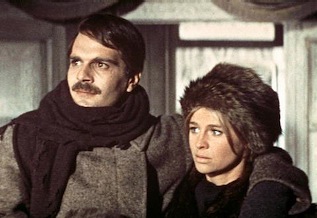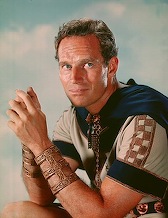Lights, cameras, pageantry: TCM's Gigantic World of Epics is suitably towering
12/17/09 01:41 PM


By ED BARK
Cue the mega-majestic score. Assemble the hordes of extras. Butter the jumbo tub of popcorn. Hope for a bladder-easing intermission.
TCM's one-hour The Gigantic World of Epics (Sunday, Dec. 20th at 7 p.m. central) is less than one-third the length of the real thing. It's a crowd-pleaser nonetheless, taking viewers on an economical journey through a mostly yesteryear collection of wide-screen, big-budget extravaganzas shepherded by Hollywood giants.
Interviewees include Stephen Spielberg, Kenneth Branagh, descendants of famed producers/directors/actors and Omar Sharif, who emerges as the scene-stealer.
Sharif, who co-starred in both Lawrence of Arabia and Doctor Zhivago, is charmingly candid and self-deprecating.
His Oscar-nominated performance as Zhivago's title character remains "one of my least favorite performances," Shariff says, judging himself "terrible."
He also recalls Zhivago co-star Julie Christie as an unpretentious early-day "beatnik" who used to mess up her makeup and wardrobe by eating messy fried egg sandwiches during breaks.
And although prolific producer Sam Spiegel was a longtime friend, he made only four worthwhile movies in Sharif's view. Namely, Arabia, The African Queen, On the Waterfront and The Bridge on the River Kwai.
"Apart from that, all of his films are quasi-disasters," Sharif says good-naturedly.
The special moves along at a quick but instructive pace, with the titles of its mini-chapters grandly etched in stone. Its spotlights shine brightest on Zhivago, Arabia, Gone with the Wind, The Ten Commandments and Ben-Hur, for which star Charlton Heston won a best actor Oscar in an epic best known for its unparalleled chariot race.
"Somehow he had the dignity and the majesty without the pomposity," Branagh says of Heston, who also played Moses in Commandments.
In those pre-computer times, epic directors shot tremendous amounts of film, leaving "this huge pile of raw lumber" to be made into a building, as Heston's son, Fraser, puts it. Absent CGI technology, massive sets were built from scratch in order to induce the proper scope and pageantry.
The genre fell on hard times after Mutiny on the Bounty (1962) and Cleopatra (1963) burned money without making nearly as much as anticipated. The Fall of the Roman Empire (1964) then bombed big-time, souring studios on epics until Dances with Wolves (1990), Braveheart (1995) and Gladiator (2000) successively were critical and commercial successes.
Spielberg, a co-producer of Gladiator, says your basic epic amounts to "a really good story based on a big idea with big characters."
Filmmaker Cecil B. DeMille remains the genre's foremost practitioner based on just two mighty strokes -- Ben-Hur and Commandments. His granddaughter, Cecilia, notes that he was 74 when filming on Commandments began. DeMille had a major heart attack after climbing a ladder to look at a tracking shot. He lived to see Commandments completed, but never fully recovered his health, she says.
That was a fitting way for Hollywood's consummate showman to go out. And TCM's Gigantic World of Epics pretty much measures up to the task of offering a very abridged history of the way it was and still can be. Behold the Lord of the Rings trilogy. Biblical or not, DeMille would have found lots to like.
GRADE: B+
PROGRAMMING NOTE -- TCM is surrounding The Gigantic World of Epics with some epic films. Here's the Sunday schedule, with all times central:
5 a.m. -- Raintree County (1957)
8:30 a.m. -- How the West Was Won (1962)
11:30 a.m. -- Doctor Zhivago (1965)
3 p.m. -- Ben-Hur (1959)
8 p.m. -- The King of Kings (1961)
11 p.m. -- King of Kings (1927)
2 a.m. -- Children of Paradise (1945)
